新SAT官方试题第四套答案
- 格式:pdf
- 大小:1.34 MB
- 文档页数:41
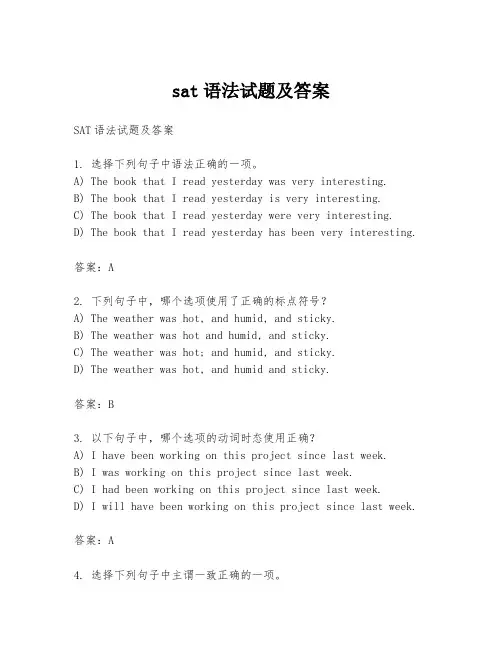
sat语法试题及答案SAT语法试题及答案1. 选择下列句子中语法正确的一项。
A) The book that I read yesterday was very interesting.B) The book that I read yesterday is very interesting.C) The book that I read yesterday were very interesting.D) The book that I read yesterday has been very interesting. 答案:A2. 下列句子中,哪个选项使用了正确的标点符号?A) The weather was hot, and humid, and sticky.B) The weather was hot and humid, and sticky.C) The weather was hot; and humid, and sticky.D) The weather was hot, and humid and sticky.答案:B3. 以下句子中,哪个选项的动词时态使用正确?A) I have been working on this project since last week.B) I was working on this project since last week.C) I had been working on this project since last week.D) I will have been working on this project since last week. 答案:A4. 选择下列句子中主谓一致正确的一项。
A) The team are playing well together.B) The team is playing well together.C) The players are playing well together.D) The players is playing well together.答案:B5. 下列句子中,哪个选项使用了正确的平行结构?A) She enjoys reading, to swim, and hiking.B) She enjoys reading, swimming, and hiking.C) She enjoys to read, to swim, and hiking.D) She enjoys reading, swimming, and to hike. 答案:B6. 选择下列句子中语法正确的一项。
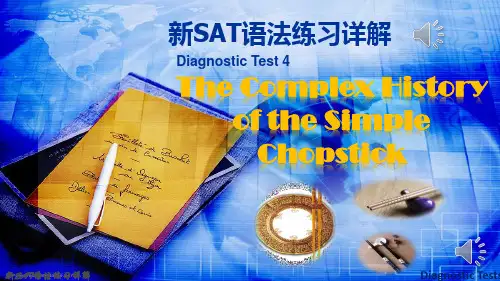
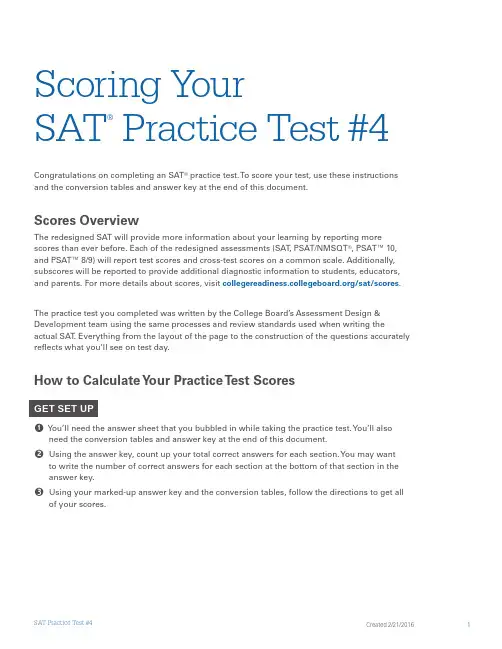
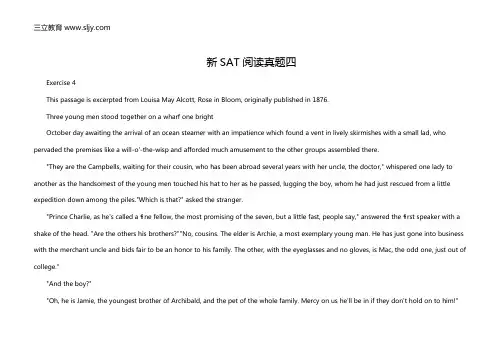
新SAT阅读真题四Exercise 4This passage is excerpted from Louisa May Alcott, Rose in Bloom, originally published in 1876.Three young men stood together on a wharf one brightOctober day awaiting the arrival of an ocean steamer with an impatience which found a vent in lively skirmishes with a small lad, who pervaded the premises like a will-o'-the-wisp and afforded much amusement to the other groups assembled there."They are the Campbells, waiting for their cousin, who has been abroad several years with her uncle, the doctor," whispered one lady to another as the handsomest of the young men touched his hat to her as he passed, lugging the boy, whom he had just rescued from a little expedition down among the piles."Which is that?" asked the stranger."Prince Charlie, as he's called a fine fellow, the most promising of the seven, but a little fast, people say," answered the first speaker with a shake of the head. "Are the others his brothers?""No, cousins. The elder is Archie, a most exemplary young man. He has just gone into business with the merchant uncle and bids fair to be an honor to his family. The other, with the eyeglasses and no gloves, is Mac, the odd one, just out of college.""And the boy?""Oh, he is Jamie, the youngest brother of Archibald, and the pet of the whole family. Mercy on us he'll be in if they don't hold on to him!"The ladies' chat came to a sudden end just there, for by the time Jamie had been fished out of a hogshead, the steamer hove in sight and everything else was forgotten. As it swung slowly around to enter the dock, a boyish voice shouted, "There she is! I see her and Uncle and Phebe! Hooray for Cousin Rose!" And three small cheers were given with a will by Jamie as he stood on a post waving his arms like a windmill while his brother held onto the tail of his jacket.Yes, there they were, Uncle Alec swinging his hat like a boy, with Phebe smiling and nodding on one side and Rosekissing both hands delightedly on the other as she recognized familiar faces and heard familiar voices welcoming her home."Bless her dear heart, she's bonnier than ever! Looks like a Madonna doesn't she? with that blue cloak round her, and her bright hair flying in the wind!" said Charlie excitedly as they watched the group upon the deck with eager eyes."Madonnas don't wear hats like that. Rose hasn't changed much, but Phebe has. Why, she's a regular beauty!" answered Archie, staring with all his might at the dark-eyed young woman with the brilliant color and glossy black braids shining in the sun."Dear old Uncle! Doesn't it seem good to have him back?" was all Mac said, but he was not looking at "dear old uncle" as he made the fervent remark, for he saw only the slender blond girl nearby and stretched out his hands to meet hers, forgetful of the green water tumbling between them.During the confusion that reigned for a moment as the steamer settled to her moorings, Rose looked down into the four faces upturned to hers and seemed to read in them something that both pleased and pained her. It was only a glance, and her own eyes were full, but through the mist of happy tears she received the impression that Archie was about the same, that Mac had decidedly improved, and that something was amiss with Charlie. There was no time for observation, however, for in a moment the shoreward rush began, and before shecould grasp her traveling bag, Jamie was clinging to her like an ecstatic young bear. She was with difficulty released from his embrace to fall into the gentler ones of the elder cousins, who took advantage of the general excitement to welcome both blooming girls with affectionate impartiality. Then the wanderers were borne ashore in a triumphal procession, while Jamie danced rapturous jigs before them even on the gangway.Archie remained to help his uncle get the luggage through the Custom House, and the others escorted the damsels home. No sooner were they shut up in a carriage, however, than a new and curious constraint seemed to fall upon the young people, for they realized, all at once, that their former playmates were men and women now.Which choice best summarizes the passage?A The passage provides an explanation of relationships within a family.B The passage presents a revelation about children growing older.C The passage captures a conversation regarding reuniting cousins.D The passage describes an anecdote about traveling by ship.QUESTION 2 OF 11Over the course of the passage, the attitude of the cousins shifts fromA preoccupation to constraint.B apprehension to embarrassment.C anticipation to reticence.D contemplation to diffidence.QUESTION 3 OF 11Which statement best characterizes the relationship among the reunited cousins?A They are excited to get back to their ordinary lives and friendships.B They have changed too dramatically to find anything in common.C The younger cousins help put the older cousins at ease.D Their growing up has put limitations on their relationships.QUESTION 4 OF 11As used in line 3 (“vent”) , “vent” most nearly meansA opening.B outlet.C crack.D passage.QUESTION 5 OF 11The conversation between the lady and the stranger in lines 7–26(“"They are the Campbells, waiting for their cousin, who has beenabroad several years with her uncle, the doctor," whispered one lady to another as the handsomest of the young men touched his hat to her as he passed, lugging the boy, whom he had just rescued from a little expedition down among the piles.”) (“They . . . him”) serves primarily to A show how the town locals tend to gossip about the family. B establish the relationships among the reuniting family. C introduce the traits of the family members who are waiting.D demonstrate the lady’s lack of knowledge about the family.QUESTION 6 OF 11Which choice provides the best evidence for the answer to the previous question?A lines 7–8(“They are the Campbells, waiting for theircousin, who has been abroad several years with her uncle, the doctor,"”)(“They . . . doctor”)B lines 14–15(“"Prince Charlie, as he's called a fine fellow, the most promising of the seven, but a little fast, people say,"”)(“Prince . . . say”)C lines 18–20(“The elder is Archie, a most exemplary young man. He has just gone into business with the merchant uncle and bids fair to be an honor to his family. ”)(“The . . . family”)D lines 24–26(“"Oh, he is Jamie, the youngest brother of Archibald, and the pet of the whole family. Mercy on us he'll be in if they don't hold on to him”)(“Oh . . . him”)QUESTION 7 OF 11Archie’s comments in lines 44–45 (“"Madonnas don't wear hats like that. Rose hasn't changed much, but Phebe has. Why, she's a regular beauty!””) (“Madonnas . . . beauty”) primarily indicate that heA disagrees strongly with Charlie.B finds Phebe to be beautiful.C thinks Rose looks like a Madonna.D feels distracted by Rose and Phebe.QUESTION 8 OF 11The description (lines 50–53(“ was all Mac said, but he was not looking at "dear old uncle" as he made the fervent remark, for he saw only the slender blond girl nearby and stretched out his hands to meet hers, forgetful of the green water tumbling between them.”) ) that follows Mac's comment in line 49 (“"Dear old Uncle! Doesn't it seem good to have him back?””) ("Dear . . . back") reveals that Mac isA not actually paying attention to his uncle.B unaware of the possibility of falling in the ocean.C more excited to see his uncle than he is to see Rose.D distracted by all the excitement in the crowd.QUESTION 9 OF 11It can be inferred that Rose is "both pleased and pained" when she views her cousins from the ship because sheA feels exhausted and confused after a long journey by sea.B believes her cousins don’t recognize her anymore.C senses that her relationship with her cousins has changed.D concludes that her cousins’ lives have gotten better without her.QUESTION 10 OF 11Which choice provides the best evidence for the answer to the previous question?A lines 57–61(“It was only a glance, and her own eyes were full, but through the mist of happy tears she received the impression that Archie was about the same, that Mac had decidedly improved, and that something was amiss with Charlie.”)(“It . . . Charlie”)B lines 64–68(“ She was with difficulty released from his embrace to fall into the gentler ones of the elder cousins, who took advantage of the general excitement to welcome both blooming girls with affectionate impartiality. ”)(“She . . . impartiality”)C lines 61–64(“ There was no time for observation,however, for in a moment the shoreward rush began, and before she could grasp her traveling bag, Jamie was clinging to her like an ecstatic young bear.”)(“There . . . bear”)D lines 73–76(“No sooner were they shut up in a carriage, however, than a new and curious constraint seemed to fall upon the young people, for they realized, all at once, that their former playmates were men and women now.”)(“No . . . now”)QUESTION 11 OF 11As used in lines 67–68 (“affectionate impartiality”), the phrase “affectionate impartiality” most nearly meansA restraint.B aloofness.C tenderness.D enthusiasm.参考答案:BCDBBABACDA。
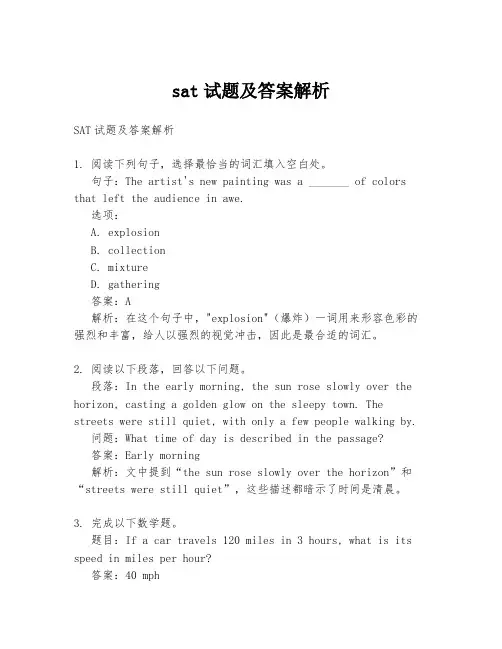
sat试题及答案解析SAT试题及答案解析1. 阅读下列句子,选择最恰当的词汇填入空白处。
句子:The artist's new painting was a _______ of colors that left the audience in awe.选项:A. explosionB. collectionC. mixtureD. gathering答案:A解析:在这个句子中,"explosion"(爆炸)一词用来形容色彩的强烈和丰富,给人以强烈的视觉冲击,因此是最合适的词汇。
2. 阅读以下段落,回答以下问题。
段落:In the early morning, the sun rose slowly over the horizon, casting a golden glow on the sleepy town. The streets were still quiet, with only a few people walking by.问题:What time of day is described in the passage?答案:Early morning解析:文中提到“the sun rose slowly over the horizon”和“streets were still quiet”,这些描述都暗示了时间是清晨。
3. 完成以下数学题。
题目:If a car travels 120 miles in 3 hours, what is its speed in miles per hour?答案:40 mph解析:速度的计算公式是距离除以时间。
因此,120英里除以3小时等于40英里每小时。
4. 阅读下列句子,判断下列陈述是否正确。
句子:The scientist's hypothesis was proven incorrectafter the experiment.陈述:The experiment confirmed the scientist's hypothesis.答案:错误解析:句子中提到“hypothesis was proven incorrect”,意味着实验结果与科学家的假设相反,因此陈述是错误的。
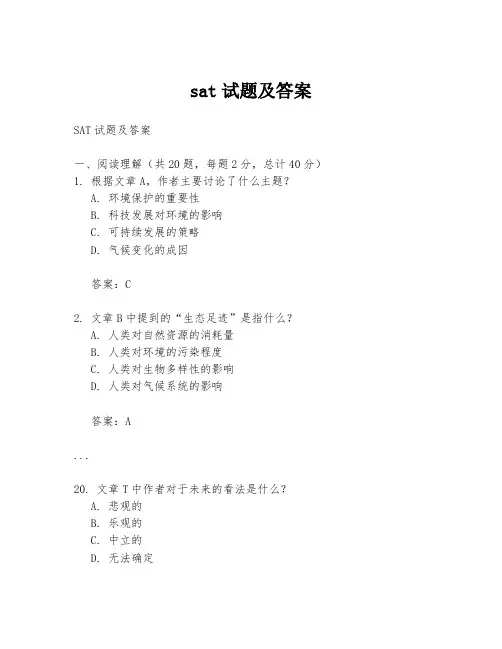
sat试题及答案SAT试题及答案一、阅读理解(共20题,每题2分,总计40分)1. 根据文章A,作者主要讨论了什么主题?A. 环境保护的重要性B. 科技发展对环境的影响C. 可持续发展的策略D. 气候变化的成因答案:C2. 文章B中提到的“生态足迹”是指什么?A. 人类对自然资源的消耗量B. 人类对环境的污染程度C. 人类对生物多样性的影响D. 人类对气候系统的影响答案:A...20. 文章T中作者对于未来的看法是什么?A. 悲观的B. 乐观的C. 中立的D. 无法确定答案:B二、写作(共1题,总计20分)21. 根据所给材料,写一篇不少于500字的议论文,阐述你对“教育公平”的看法。
答案:略三、数学(共20题,每题2分,总计40分)22. 如果一个圆的半径是5厘米,那么它的面积是多少平方厘米?A. 78.5B. 100C. 157D. 196答案:A23. 一个直角三角形的两条直角边分别是3厘米和4厘米,那么它的斜边是多少厘米?A. 5B. 6C. 7D. 8答案:A...41. 如果一个数列的前三项是2, 4, 6,那么这个数列的第10项是多少?A. 20B. 22C. 24D. 26答案:A四、语法(共20题,每题2分,总计40分)42. 下列句子中,语法正确的是:a) She is one of the student who is going to the concert.b) He has more books than me.c) The children was playing in the park.d) I have been living here for two years.答案:d43. 选择正确的动词形式填空:The teacher _______ (explain/explained) the concept to the students yesterday.答案:explained...61. 选择正确的形容词填空:The _______ (boring/interested) lecture made the audience fell asleep.答案:boring五、词汇(共10题,每题2分,总计20分)62. 选择与“innovative”意思相近的词:A. TraditionalB. ConservativeC. CreativeD. Outdated答案:C63. 选择与“compromise”意思相反的词:A. AgreementB. DisputeC. ConflictD. Resolution答案:C...71. 选择与“meticulous”意思相同的词:A. CarelessB. SloppyC. ThoroughD. Haphazard答案:C请注意:以上内容为示例,实际SAT试题及答案会根据考试的具体内容而有所不同。
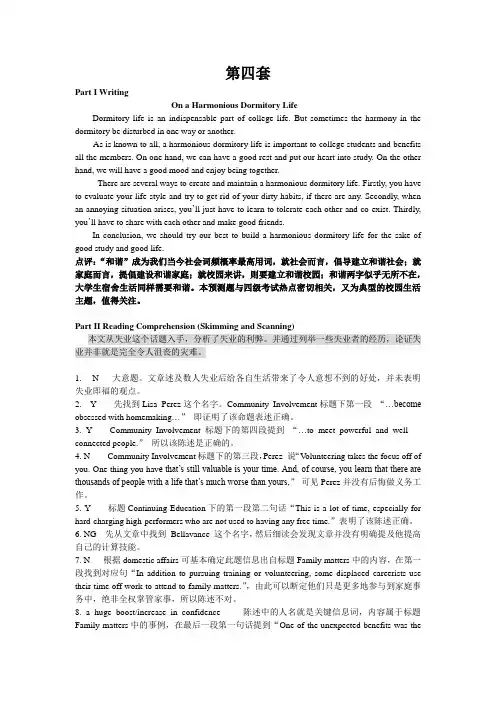
第四套Part I WritingOn a Harmonious Dormitory LifeDormitory life is an indispensable part of college life. But sometimes the harmony in the dormitory be disturbed in one way or another.As is known to all, a harmonious dormitory life is important to college students and benefits all the members. On one hand, we can have a good rest and put our heart into study. On the other hand, we will have a good mood and enjoy being together.There are several ways to create and maintain a harmonious dormitory life. Firstly, you have to evaluate your life-style and try to get rid of your dirty habits, if there are any. Secondly, when an annoying situation arises, you’ll just have to learn to tolerate each other and co-exist. Thirdly, you’ll have to share with each other and make good friends.In conclusion, we should try our best to build a harmonious dormitory life for the sake of good study and good life.点评:“和谐”成为我们当今社会词频概率最高用词,就社会而言,倡导建立和谐社会;就家庭而言,提倡建设和谐家庭;就校园来讲,则要建立和谐校园;和谐两字似乎无所不在,大学生宿舍生活同样需要和谐。
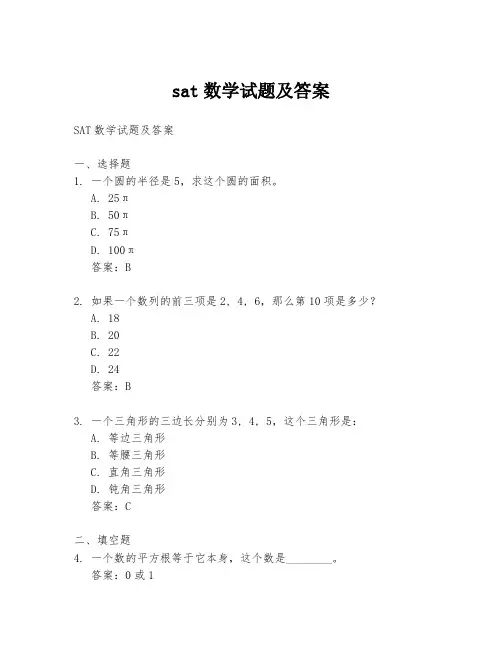
sat数学试题及答案SAT数学试题及答案一、选择题1. 一个圆的半径是5,求这个圆的面积。
A. 25πB. 50πC. 75πD. 100π答案:B2. 如果一个数列的前三项是2, 4, 6,那么第10项是多少?A. 18B. 20C. 22D. 24答案:B3. 一个三角形的三边长分别为3, 4, 5,这个三角形是:A. 等边三角形B. 等腰三角形C. 直角三角形D. 钝角三角形答案:C二、填空题4. 一个数的平方根等于它本身,这个数是________。
答案:0或15. 如果一个函数f(x) = 3x + 5,求f(-2)的值。
答案:-16. 一个长方形的长是10厘米,宽是5厘米,求它的周长。
答案:30厘米三、简答题7. 一个圆的周长是31.4厘米,求这个圆的直径。
解:根据圆的周长公式C = πd,我们有31.4 = πd。
解得d = 31.4 / π ≈ 10厘米。
8. 一个等差数列的首项是5,公差是3,求第20项的值。
解:等差数列的通项公式为an = a1 + (n - 1)d。
将首项a1 = 5和公差d = 3代入公式,得到a20 = 5 + (20 - 1) * 3 = 5 + 57 = 62。
9. 一个直角三角形的两条直角边分别是6和8,求斜边的长度。
解:根据勾股定理,斜边c的长度等于两直角边的平方和的平方根,即c = √(6² + 8²) = √(36 + 64) = √100 = 10。
四、解答题10. 一个工厂生产了1000个零件,其中5%是次品。
如果工厂决定只出售合格的零件,那么工厂将出售多少个零件?解:首先计算次品的数量,1000 * 5% = 50个。
然后从总数中减去次品的数量,得到出售的合格零件数量:1000 - 50 = 950个。
11. 一个投资项目预计在第一年结束时产生$10,000的利润,如果每年的增长率为5%,那么第三年结束时的利润是多少?解:使用复合利息公式计算,P = P0 * (1 + r)^n,其中P0是初始利润,r是增长率,n是年数。
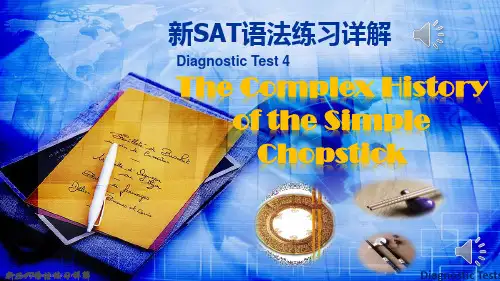
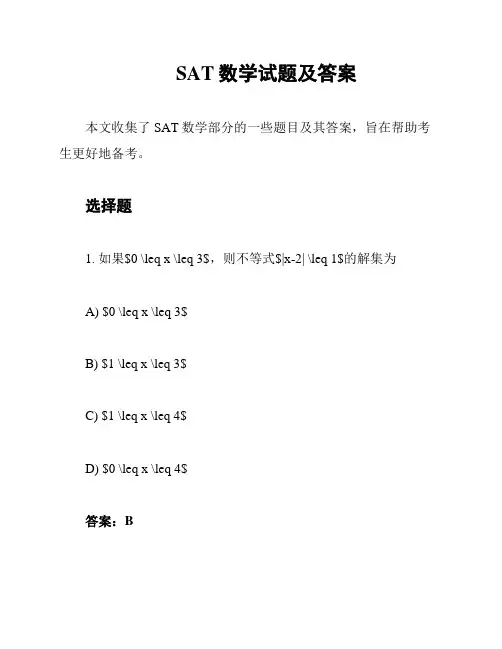
SAT数学试题及答案本文收集了SAT数学部分的一些题目及其答案,旨在帮助考生更好地备考。
选择题1. 如果$0 \leq x \leq 3$,则不等式$|x-2| \leq 1$的解集为A) $0 \leq x \leq 3$B) $1 \leq x \leq 3$C) $1 \leq x \leq 4$D) $0 \leq x \leq 4$答案:B解析:不等式 $|x-2| \leq 1$ 表示 $x$ 到 $2$ 的距离小于等于$1$。
当 $x$ 在区间 $[1,3]$ 时,$x$ 到 $2$ 的距离都不超过 $1$,因此解集为 $1 \leq x \leq 3$。
2. 抛物线 $y=x^2-2x-3$ 的顶点坐标为A) $(0,-3)$B) $(1,-4)$C) $(2,-3)$D) $(3,0)$答案:C解析:抛物线的顶点坐标为$(\frac{-b}{2a},c-\frac{b^2}{4a})$,其中 $a$、$b$、$c$ 分别是二次项系数、一次项系数和常数项。
将$y=x^2-2x-3$ 化为标准形式,即 $y=(x-1)^2-4$,可知该抛物线的顶点坐标为 $(1,-4)$。
填空题3. 矩阵 $\begin{matrix}3 & 2 \\1 & 4\end{matrix}$ 的逆矩阵是$$\begin{pmatrix}\text{______} & \text{______} \\ \text{______} & \text{______} \end{pmatrix}$$**答案:$\begin{pmatrix}\frac{4}{5} & -\frac{2}{5} \\-\frac{1}{5} & \frac{3}{5}\end{pmatrix}$**解析:设 $\begin{pmatrix}a &b \\c & d\end{pmatrix}$ 表示该矩阵的逆矩阵,则有 $ \begin{pmatrix}3 & 2 \\1 & 4\end{pmatrix}\begin{pmatrix}a &b \\c & d\end{pmatrix}= \begin{pmatrix}1 & 0 \\0 & 1\end{pmatrix},$ 即 $\begin{cases}3a+2c=1, \\3b+2d=0, \\a+4c=0, \\b+4d=1. \\\end{cases}$ 解得逆矩阵为 $\begin{pmatrix}\frac{4}{5} & -\frac{2}{5} \\-\frac{1}{5} & \frac{3}{5}\end{pmatrix}$。
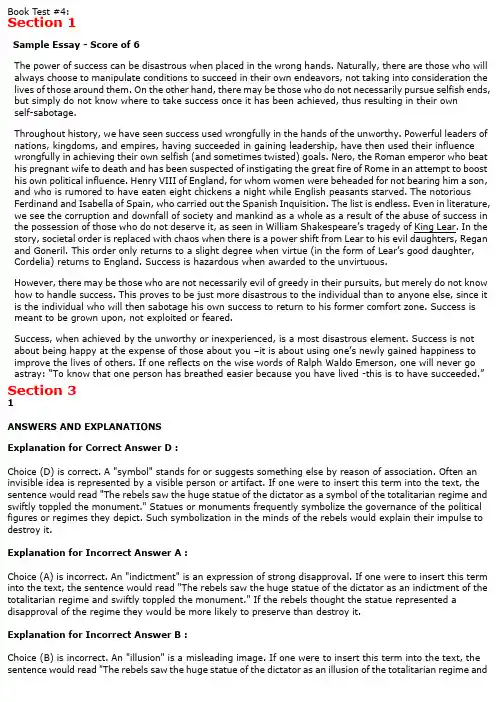
Book Test #4:Section 1Sample Essay - Score of 6The power of success can be disastrous when placed in the wrong hands. Naturally, there are those who will always choose to manipulate conditions to succeed in their own endeavors, not taking into consideration the lives of those around them. On the other hand, there may be those who do not necessarily pursue selfish ends, but simply do not know where to take success once it has been achieved, thus resulting in their ownself-sabotage.Throughout history, we have seen success used wrongfully in the hands of the unworthy. Powerful leaders of nations, kingdoms, and empires, having succeeded in gaining leadership, have then used their influence wrongfully in achieving their own selfish (and sometimes twisted) goals. Nero, the Roman emperor who beat his pregnant wife to death and has been suspected of instigating the great fire of Rome in an attempt to boost his own political influence. Henry VIII of England, for whom women were beheaded for not bearing him a son, and who is rumored to have eaten eight chickens a night while English peasants starved. The notorious Ferdinand and Isabella of Spain, who carried out the Spanish Inquisition. The list is endless. Even in literature, we see the corruption and downfall of society and mankind as a whole as a result of the abuse of success in the possession of those who do not deserve it, as seen in William Shakespeare’s tragedy of King Lear. In the story, societal order is replaced with chaos when there is a power shift from Lear to his evil daughters, Regan and Goneril. This order only returns to a slight degree when virtue (in the form of Lear’s good daughter, Cordelia) returns to England. Success is hazardous when awarded to the unvirtuous.However, there may be those who are not necessarily evil of greedy in their pursuits, but merely do not know how to handle success. This proves to be just more disastrous to the individual than to anyone else, since it is the individual who will then sabotage his own success to return to his former comfort zone. Success is meant to be grown upon, not exploited or feared.Success, when achieved by the unworthy or inexperienced, is a most disastrous element. Success is not about being happy at the expense of those about you –it is about us ing one’s newly gained happiness to improve the lives of others. If one reflects on the wise words of Ralph Waldo Emerson, one will never go astray: ―To know that one person has breathed easier because you have lived -this is to have succeeded.‖Section 31ANSWERS AND EXPLANATIONSExplanation for Correct Answer D :Choice (D) is correct. A "symbol" stands for or suggests something else by reason of association. Often an invisible idea is represented by a visible person or artifact. If one were to insert this term into the text, the sentence would read "The rebels saw the huge statue of the dictator as a symbol of the totalitarian regime and swiftly toppled the monument." Statues or monuments frequently symbolize the governance of the political figures or regimes they depict. Such symbolization in the minds of the rebels would explain their impulse to destroy it.Explanation for Incorrect Answer A :Choice (A) is incorrect. An "indictment" is an expression of strong disapproval. If one were to insert this term into the text, the sentence would read "The rebels saw the huge statue of the dictator as an indictment of the totalitarian regime and swiftly toppled the monument." If the rebels thought the statue represented a disapproval of the regime they would be more likely to preserve than destroy it.Explanation for Incorrect Answer B :Choice (B) is incorrect. An "illusion" is a misleading image. If one were to insert this term into the text, the sentence would read "The rebels saw the huge statue of the dictator as an illusion of the totalitarian regime andswiftly toppled the monument." It could be possible that the rebels saw the statue as a misleading image of the regime, but the sentence does not clearly support or explain such an interpretation.Explanation for Incorrect Answer C :Choice (C) is incorrect. A "copy" is an imitation. If one were to insert this term into the text, the sentence would read "The rebels saw the huge statue of the dictator as a copy of the totalitarian regime and swiftly toppled the monument." It is illogical to say that a statue of a dictator is an imitation of a regime.Explanation for Incorrect Answer E :Choice (E) is incorrect. A "mockery" is an insulting action or speech. If one were to insert this term into the text, the sentence would read "The rebels saw the huge statue of the dictator as a mockery of the totalitarian regime and swiftly toppled the monument." If the rebels thought the statue was insulting the regime, they would be more likely to preserve than destroy it.2ANSWERS AND EXPLANATIONSExplanation for Correct Answer A :Choice (A) is correct. "Adept" means highly skillful. If one were to insert this term into the text, the sentence would read "Residents of the isolated island were forced to master the art of navigation, becoming the ocean's most adept sailors." It makes sense to say that those who had mastered the art of navigation became adept, or highly skilled, sailors.Explanation for Incorrect Answer B :Choice (B) is incorrect. "Temperamental" means unpredictable in behavior. If one were to insert this term into the text, the sentence would read "Residents of the isolated island were forced to master the art of navigation, becoming the ocean's most temperamental sailors." That the islanders were masters of navigation would probably mean that they did not behave unpredictably.Explanation for Incorrect Answer C :Choice (C) is incorrect. "Congeniality" means friendliness. If one were to insert this term into the text, the sentence would read "Residents of the isolated island were forced to master the art of navigation, becoming the ocean's most congenial sailors." Masters of navigation are not necessarily friendly sailors.Explanation for Incorrect Answer D :Choice (D) is incorrect. "Vulnerable" means open to attack or injury. If this term were inserted into text, the sentence would read "Residents of the isolated island were forced to master the art of navigation, becoming the ocean's most vulnerable sailors." Master navigators would likely be less open to injury or attack than other, less experienced sailors.Explanation for Incorrect Answer E :Choice (E) is incorrect. "Reclusive" means withdrawn or preferring solitude. If one were to insert this term into the text, the sentence would read "Residents of the isolated island were forced to master the art of navigation, becoming the ocean's most reclusive sailors." While living on an isolated island might cause the sailors to prefer solitude, reclusivity does not describe their mastery of sea travel.3ANSWERS AND EXPLANATIONSExplanation for Correct Answer B :Choice (B) is correct. "Penchant" means an inclination, and "to pilfer" means to steal. If one were to insert these terms into the text, the sentence would read "The spotted bowerbird has a penchant for amassing the bright shiny objects it needs for decorating its bower: it will enter houses to pilfer cutlery, coins, thimbles, nails, screws, even car keys." In this sentence, the statement following the colon expands on what precedes it. Describing how bowerbirds steal objects from homes expands on the idea that they tend to amass bright shiny objects for their bower.Explanation for Incorrect Answer A :Choice (A) is incorrect. "Knack" means a skillful ability, and "to assess" means to evaluate. If one were to insert these terms into the text, the sentence would read "The spotted bowerbird has a knack for amassing the bright shiny objects it needs for decorating its bower: it will enter houses to assess cutlery, coins, thimbles, nails, screws, even car keys." Although a bowerbird may be skillful at gathering shiny objects, it is unlikely that the bird would enter a house simply to assess, or evaluate, the objects found in a house, without then stealing them.Explanation for Incorrect Answer C :Choice (C) is incorrect. "Purpose" means a reason, and "to dispense" means to distribute or get rid of. If one were to insert these terms into the text, the sentence would read "The spotted bowerbird has a purpose for amassing the bright shiny objects it needs for decorating its bower: it will enter houses to dispense cutlery, coins, thimbles, nails, screws, even car keys." Although a bowerbird may have a reason for amassing shiny objects, it would enter a house to find objects, not get rid of them.Explanation for Incorrect Answer D :Choice (D) is incorrect. A "predilection" is a preference, and "to disturb" means to disrupt or unsettle. If one were to insert these terms into the text, the sentence would read "The spotted bowerbird has a predilection for amassing the bright shiny objects it needs for decorating its bower: it will enter houses to disturb cutlery, coins, thimbles, nails, screws, even car keys." If a bowerbird had a predilection, or preference, for gathering shiny objects, the bird wouldn’t enter a house simply to disturb the objects found there; it would want to gather them.Explanation for Incorrect Answer E :Choice (E) is incorrect. A "remedy" is a cure, and "to raid" means to loot or plunder. If one were to insert these terms into the text, the sentence would read "The spotted bowerbird has a remedy for amassing the bright shiny objects it needs for decorating its bower: it will enter houses to raid cutlery, coins, thimbles, nails, screws, even car keys." Although a b owerbird may enter a house to raid shiny objects, it doesn’t make sense to say that the bird has a remedy, or cure, for amassing shiny objects.4ANSWERS AND EXPLANATIONSExplanation for Correct Answer A :Choice (A) is correct. "Inseparable from" means incapable of being separated, and "legitimacy" means conforming to socially accepted standards. If one were to insert these terms into the text, the sentence would read "Not only was the science of Hildegard of Bingen inseparable from her theology, but her religious visions helped give her scientific works legitimacy by winning her the support of medieval church authorities." The "Not only. . . but" construction indicates that the second clause of the sentence will be consistent with, and may extend the meaning of, the first clause. It makes sense that the support of the influential medieval church for theologically based scientific works would provide her works with legitimacy.Explanation for Incorrect Answer B :Choice (B) is incorrect. "Unconcerned with" means not related to, and "prestige" means high social respect or regard. If one were to insert these terms into the text, the sentence would read "Not only was the science ofHildegard of Bingen unconcerned with her theology, but her religious visions helped give her scientific works prestige by winning her the support of medieval church authorities." If the support of the church won her scientific work high social regard, then it would likely be related to theology.Explanation for Incorrect Answer C :Choice (C) is incorrect. "Derived from" means to come from another place of origin, and "profundity" means depth of meaning. If one were to insert these terms into the text, the sentence would read "Not only was the science of Hildegard of Bingen derived from her theology, but her religious visions helped give her scientific works profundity by winning her the support of medieval church authorities." Although her science may have been derived from her theology, it doesn't follow that the church's support would make her work more profound.Explanation for Incorrect Answer D :Choice (D) is incorrect. "Related to" means connected with, and "accuracy" means correctness. If one were to insert these terms into the text, the sentence would read "Not only was the science of Hildegard of Bingen related to her theology, but her religious visions helped give her scientific works accuracy by winning her the support of medieval church authorities." Although her science may have been related to her theology, it doesn't follow that the church's support would make her work more accurate.Explanation for Incorrect Answer E :Choice (E) is incorrect. "Diminished by" means lessened by or weakened, and "detachment" means objectivity. If one were to insert these terms into the text, the sentence would read "Not only was the science of Hildegard of Bingen diminished by her theology, but her religious visions helped give her scientific works detachment by winning her the support of medieval church authorities." Although her scientific work could have been weakened by her theology, it doesn't make sense to say that her visions or the church's support gave her scientific works objectivity. It is more likely that such support would weaken her work's objectivity.5ANSWERS AND EXPLANATIONSExplanation for Correct Answer A :Choice (A) is correct. "Elitist" means favoring a small, high-status group, and "perquisites" are privileges. If one were to insert these terms into the text, the sentence would read "Opponents of the research institute label it an elitist anachronism; its scholars, they allege, have perquisites rivaling those of pre-Revolutionary French nobility." A research institute that provides perquisites, or privileges, that are so excessive that they rival those of pre-Revolutionary French nobility can appropriately be called elitist, or favoring a small, high-status group.Explanation for Incorrect Answer B :Choice (B) is incorrect. "Monarchical" means pertaining to a king, and "tribulations" are sufferings. If one were to insert these terms into the text, the sentence would read "Opponents of the research institute label it a monarchical anachronism; its scholars, they allege, have tribulations rivaling those of pre-Revolutionary French nobility." The pre-Revolutionary French nobility were not known for their suffering, and it is unlikely that the opponents of the research institute would criticize the institute's scholars for having tribulations, or sufferings.Explanation for Incorrect Answer C :Choice (C) is incorrect. "Irreproachable" means faultless, and "luxuries" are extravagant comforts. If one were to insert these terms into the text, the sentence would read "Opponents of the research institute label it an irreproachable anachronism; its scholars, they allege, have luxuries rivaling those of pre-Revolutionary French nobility." Opponents of an institution would not call it faultless and would criticize the institution for lavishing luxuries on its scholars.Choice (D) is incorrect. "Reprehensible" means deserving blame, and "afflictions" are sufferings. If one were to insert these terms into the text, the sentence would read "Opponents of the research institute label it a reprehensible anachronism; its scholars, they allege, have afflictions rivaling those of pre-Revolutionary French nobility." Although opponents might label the institute reprehensible, or blameworthy, they would not be likely to criticize the institute's scholars for having afflictions, or sufferings. Furthermore, thepre-Revolutionary nobility were not known for their suffering.Explanation for Incorrect Answer E :Choice (E) is incorrect. "Commendable" means praiseworthy, and "privileges" are deserved rights or luxuries. If one were to insert these terms into the text, the sentence would read "Opponents of the research institute label it a commendable anachronism; its scholars, they allege, have privileges rivaling those ofpre-Revolutionary French nobility." Opponents who accuse the institute of providing excessive privileges would not characterize it as commendable, or praiseworthy.6ANSWERS AND EXPLANATIONSExplanation for Correct Answer C :Choice (C) is correct. While the author of Passage 2 is critical of Linnaeus’ legacy, the author of Passage 1 expresses appreciation of his contribution to natural history, describing it as "enormous and essential." Explanation for Incorrect Answer A :Choice (A) is incorrect. The author of Passage 1 does not regard Linnaeus with "cynicism," or scornful distrust. On the contrary, the passage expresses great respect for his significant contribution to science. Explanation for Incorrect Answer B :Choice (B) is incorrect. Neither author expresses any "bafflement," or confusion, regarding Linnaeus or the historical role he played in the field of science.Explanation for Incorrect Answer D :Choice (D) is incorrect. The author of Passage 1 does not express "nostalgia," or bittersweet longing, for Linnaeus or for the era in which he lived.Explanation for Incorrect Answer E :Choice (E) is incorrect. While Passage 1 asserts that scientists misused the system of classification, there is no suggestion that the author feels "resentful" of, or personally wronged by, Linnaeus.7ANSWERS AND EXPLANATIONSExplanation for Correct Answer D :Choice (D) is correct. Unlike Passage 1, Passage 2 uses a first-person narrative voice that openly expresses the author’s "wariness" regarding Linnaeus' contribution to natural science.Explanation for Incorrect Answer A :Choice (A) is incorrect. Specific scientific facts do not appear in either passage.Choice (B) is incorrect. Neither writer uses "literary allusion," or an indirect reference to a work of literature. Explanation for Incorrect Answer C :Choice (C) is incorrect. It is Passage 1, not Passage 2, that includes historical background information on Linnaeus and on the role that classificatory systems have played in science.Explanation for Incorrect Answer E :Choice (E) is incorrect. Neither passage uses "direct citations."8ANSWERS AND EXPLANATIONSExplanation for Correct Answer A :Choice (A) is correct. Although the two authors judge Linnaeus’ work differently, they agree that his classificatory system has had a great influence on the field of natural science.Explanation for Incorrect Answer B :Choice (B) is incorrect. The author of Passage 2 claims that Linnaeus’ system limits modern human understanding of the natural world, but the author of Passage 1 does not mention science after the nineteenth century.Explanation for Incorrect Answer C :Choice (C) is incorrect. Neither passage implies that interest in biology was declining or that Linnaeus’ work renewed curiosity in the field.Explanation for Incorrect Answer D :Choice (D) is incorrect. These passages do not discuss the classification system’s ability to resolve disagreements within the scientific community. On the contrary, the author of Passage 2 writes about Linnaeus' work to raise, not settle, questions regarding the validity of classification.Explanation for Incorrect Answer E :Choice (E) is incorrect. Neither passage refers to scientific discoveries that may have laid the foundation for Linnaeus' famous system.9ANSWERS AND EXPLANATIONSExplanation for Correct Answer D :Choice (D) is correct. The author of Passage 1 argues that unlike his followers, Linnaeus probably saw his system of classification as a tool, not the goal, of science. The author of Passage 2 does not make this distinction.Explanation for Incorrect Answer A :Choice (A) is incorrect. Neither author implies that Linnaeus has not received enough recognition as a scientist. Explanation for Incorrect Answer B :Choice (B) is incorrect. Lines 12-17 intimate that the impact of Linnaeus' system was not entirely advantageous, but this section of Passage 2 does not dismiss the contributions of scientists who have integrated his work into their own.Explanation for Incorrect Answer C :Choice (C) is incorrect. The author of Passage 2 does "not dispute the value of" classification, but argues that Linnaeus' system has had a negative impact on "humans' relationship to the world."Explanation for Incorrect Answer E :Choice (E) is incorrect. Both authors agree tha t Linnaeus’ most notable contribution to natural history was his system of classifying plant and animal life.10ANSWERS AND EXPLANATIONSExplanation for Correct Answer B :Choice (B) is correct. It makes sense to say that the residents of Macondo needed "time and effort" to grow accustomed to a "persistent," or insistently continuous, noise.Explanation for Incorrect Answer A :Choice (A) is incorrect. It would be illogical to call a noise emanating from a light bulb "enthusiastic." Explanation for Incorrect Answer C :Choice (C) is incorrect. "Obvious" does not describe a noise that requires time and effort to get used to hearing. Explanation for Incorrect Answer D :Choice (D) is incorrect. In this context, "obsessive" is not used to indicate infatuation, or short-lived passion. Explanation for Incorrect Answer E :Choice (E) is incorrect. An electric generator plant may be called "hardworking." Such a term, however, does not describe a noise that takes time and effort to become used to hearing.11ANSWERS AND EXPLANATIONSExplanation for Correct Answer C :Choice (C) is correct. After paying to "share the difficulties" of the on-screen characters, the citizens felt cheated to discover that they were only actors, not real people deserving of their sympathy.Explanation for Incorrect Answer A :Choice (A) is incorrect. Although each person paid two cents for admission, nothing in the passage indicates that this charge was either excessive or the cause of their anger.Explanation for Incorrect Answer B :Choice (B) is incorrect. The audience was not angered by the on-screen adventures themselves, but rather by the fact that those events had not actually occurred.Choice (D) is incorrect. The public seemed to enjoy commiserating with characters who had fallen on hard times. The citizens were only upset to discover that they had felt real emotion on behalf of actors who were only pretending.Explanation for Incorrect Answer E :Choice (E) is incorrect. The public was not angered because the plots were "implausible," or unlikely, but rather because they were untrue.12ANSWERS AND EXPLANATIONSExplanation for Correct Answer A :Choice (A) is correct. The phonograph, an early record player, intially intrigued the citizens of Macondo.They were eventually disappointed to learn, however, that the device was mechanical, not magical, and therefore lacking in the "moving" and "human" qualities of a live musicians.Explanation for Incorrect Answer B :Choice (B) is incorrect. Nothing in the passage indicates that phonographs required any special skill to operate. Explanation for Incorrect Answer C :Choice (C) is incorrect. The passage implies that the machines were, in fact, frequently and closely observed by curious citizens on the street where they were sold.Explanation for Incorrect Answer D :Choice (D) is incorrect. Although the phonograph dampened citizens' enthusiasm for live music "for a time," they did not abandon the invention because musicians were suffering. Rather, they tired of the machines because they eventually concluded that recorded music was inferior to live music.Explanation for Incorrect Answer E :Choice (E) is incorrect. The passage is clear that it was only after the adults of Macondo had rejected the foreign record players that children were permitted to amuse themselves by dismantling them.13ANSWERS AND EXPLANATIONSExplanation for Correct Answer D :Choice (D) is correct. The citizens found the telephone disturbing because of all the new machines that strained people's ability to discern "the limits of reality"; the telephone ran most counter to what they had always thought about the natural world.Explanation for Incorrect Answer A :Choice (A) is incorrect. The citizens were not upset by the origin of the telephone, but by how it forced them to reevaluate their ideas about the world.Explanation for Incorrect Answer B :Choice (B) is incorrect.The passage does not discuss the social implications of the telephone.Choice (C) is incorrect. The citizens’ anxiety about the telephone was not related to their fears concerning the village’s daily life, but to their overall understanding of reality.Explanation for Incorrect Answer E :Choice (E) is incorrect. The passage does not address the telephone’s potential effect on the job market in Macondo.14ANSWERS AND EXPLANATIONSExplanation for Correct Answer C :Choice (C) is correct. The passage suggests that the citizens of Maconda are stuck in a cycle of "disappointment, doubt and revelation." They welcome new inventions with wonder and awe before rejecting them for being less "marvelous" and "enchanted" than they seemed.Explanation for Incorrect Answer A :Choice (A) is incorrect. Both the telephone and phonograph were operated with a crank, or turning handle, but that feature is not related to the citizens’ disappointment.Explanation for Incorrect Answer B :Choice (B) is incorrect. At no point in the passage does the educational value of these inventions come into play.Explanation for Incorrect Answer D :Choice (D) is incorrect. The townspeople are not concerned by the fact that the film projector and phonograph were created to entertain, and it can be argued that the light bulb and telephone are not meant for entertainment at all.Explanation for Incorrect Answer E :Choice (E) is incorrect. The machines were not necessarily hard to operate, and the passage suggests that the people were disappointed with them for other reasons.15ANSWERS AND EXPLANATIONSExplanation for Correct Answer D :Choice (D) is correct. The passage mainly deals with the "influx," or arrival, of technological inventions in Macondo and the citizen's mixed reactions to them.Explanation for Incorrect Answer A :Choice (A) is incorrect. Although the passage implies that the "respectable" citizens of Maconda did not typically mingle with members of the working class, the main purpose of the passage is not to make a statement about class relations within the town.Explanation for Incorrect Answer B :Choice (B) is incorrect. Although the passage describes new inventions, it does so in order to make a larger point about the way they were received among the people of Macondo.Explanation for Incorrect Answer C :Choice (C) is incorrect. The main purpose of the passage is not to show how different people had a common reaction to something "magical," but to illustrate how they responded to new technologies.Explanation for Incorrect Answer E :Choice (E) is incorrect. The passage’s purpose is not to "delineate," or describe, ideas about nature triumphing over technology. Rather, its purpose is to explain how the people of Macondo responded to new technologies. 16ANSWERS AND EXPLANATIONSExplanation for Correct Answer A :Choice (A) is correct. An admission of a lack of expertise is a disclaimer; a statement is an assertion. In the first sentence, the author admits to a lack of certain kinds of expertise; in the second sentence, the author states an opinion about Martha Graham's work.Explanation for Incorrect Answer B :Choice (B) is incorrect. No one is invoked, or appealed to, in the first sentence, and the second sentence does not define anything.Explanation for Incorrect Answer C :Choice (C) is incorrect. In the first sentence the author admits to a lack of expertise but not in an apologetic way; the second sentence is an assertion but not a confession.Explanation for Incorrect Answer D :Choice (D) is incorrect. To say that the first sentence is a statement of authority doesn't make any sense, and the second sentence is a statement of opinion but not a hypothesis, or a basis for experimental investigation. Explanation for Incorrect Answer E :Choice (E) is incorrect. The first sentence does not rebut, or challenge, anyone else's argument, and while the second sentence is an introduction to the analysis that follows in the passage, it is not itself an analysis.17ANSWERS AND EXPLANATIONSExplanation for Correct Answer B :Choice (B) is correct. The author uses the statement in discussing Graham's "instincts of a mathematician or physicist" in her approach to choreography. The quoted phrase is part of a statement that expands on an earlier point about Graham's approach to line and direction in dance, which the author of the passage believes is both mathematical and emotional.Explanation for Incorrect Answer A :Choice (A) is incorrect. Although the author does suggest that Graham sought to produce emotional effects through the use of line, there is no indication that those effects were intended to be spectacular.。
考情汇总1、难点还是集中在阅读上,小说和双篇文章登顶此次最难的两篇。
2、此次考试的语法部分没有特别难的问题,考生均反映难度适中。
3、写作部分选取的文章非常有利于考生展开分析!4、此次考试数学非常容易,就连北美的同学(美国人)都反映此次数学几乎无压力!5、加试部分为数学,难度依旧非常低。
阅读部分第一篇:小说小说选自美国经典现实主义小说 Sister Carrie,XXX为 Theodore Dreiser,最早出版于1900年。
小说描述了一个贫困的乡村姑娘来到大城市生活,内心向往富足的生活。
为了摆脱穷困,先后跟推销员和酒店经理同居,最后历经磨难,终成一个著名演员。
小说截取的部分在论述 Carrie 在看一出关于纽约奢华生活的舞台剧。
台上演员华衣美服,居所装修华丽,生活应有尽有。
Carrie 不免生出羡慕向往之心。
舞台剧还体现了这些生活在理想状态人还收到感情爱情嫉妒的折磨,这更让Carrie 羡慕,谁不愿意坐在金椅子里发愁,谁会不愿意在洒了香水的挂毯、有坐垫的家具和穿着制服的仆人那样的条件下受些折磨呢?回到她小小的 flat(套间),Carrie 暗暗下决心,假如我不能过上那样的生活,我就等于没有活过,或者说自己活过。
第二篇、自然科学科研型文章研究的主要目的在于探究人类大脑如何区分现实和虚拟(广告/小说人物/童话)信息。
研究者呈现给受试者不同的场景:一,广播听到或报纸阅读到关于布什(总统)和灰姑娘,二,跟总统或跟灰姑娘共进晚餐。
然后利用 MRL 研究他们大脑不同区域的活跃度。
现实和虚拟信息都会激起大脑某些区域比如管记忆的海马沟。
不同的是,现实信息还会激起独特的一个脑区域,这个脑区域跟短时记忆和注意力有关。
一直相对,虚拟的信息会激起一个跟语言相关的脑区域。
研究者后来又在另一拨受试者重复了实验,这次根据跟受试者现实相关的程度设置信息。
结果还是成立,研究者进一步拓展,现实和虚拟其实跟不在于人物本身的现实程度,更跟信息与受试者现实生活的相关度有关。
美国高考sat数学试题及答案美国高考SAT数学试题及答案1. 某商店进行促销活动,所有商品打8折。
如果一件商品原价为$50,那么打折后的价格是多少?A. $40B. $45C. $35D. $20答案:B2. 一个长方形的长是宽的两倍,如果宽为$x$,那么长方形的周长是多少?A. $6x$B. $4x$C. $2x$D. $8x$答案:A3. 如果一个数的平方等于36,那么这个数是多少?A. 6B. -6C. 6 或 -6D. 0答案:C4. 在一次数学测试中,平均分是75分。
如果一个学生得了80分,那么他的分数比平均分高了多少?A. 5分B. 10分C. 15分D. 20分答案:A5. 一个圆的半径是5厘米,那么这个圆的面积是多少平方厘米?A. 25πB. 50πC. 75πD. 100π答案:B6. 如果一个函数$f(x) = 2x + 3$,那么$f(-1)$的值是多少?A. -1B. 1C. 5D. 7答案:B7. 一个等差数列的首项是3,公差是2,那么这个数列的第10项是多少?A. 23B. 21C. 19D. 17答案:A8. 如果一个三角形的两边长分别是5和7,且这两边夹角是90度,那么这个三角形的面积是多少?A. 12.5B. 15C. 17.5D. 20答案:A9. 如果一个函数$g(x) = x^2 - 4x + 3$,那么这个函数的最小值是多少?A. -1B. 0C. 1D. 3答案:A10. 在一个装有红球和蓝球的袋子里,红球和蓝球的比例是2:3。
如果随机抽取一个球,抽到红球的概率是多少?A. 2/5B. 3/5C. 4/5D. 1/2答案:A结束语:以上是美国高考SAT数学部分的试题及答案,希望对准备参加SAT考试的学生有所帮助。
应Key to book4 unit1-4Unit 1Active reading (1)Looking for a job after university? First, get off the sofaReading and understandingDealing with unfamiliar words3 Match the words in the box with their definitions.1 to make progress by moving to the next stage in a series of actions or events (proceed)2 the process of changing from one situation, form or state to another (transition)3 not feeling involved with someone or something in a close or emotional way (detached)4 referring to something which will happen soon (upcoming)5 to be sitting still in a position that is not upright (slump)6 to return to a previous state or way of behaving (revert)7 to say what happened (recount)4 Complete the paragraph with the correct form of the words in Activity 3.It isn’t easy to make the (1) transition from a busy university student to an unemployed young adult (2) slumped on a bar stool or half watching a mindless television show, wondering if and how their career is going to (3) proceed. Many people who have experienced a long period of inactivity like this, when (4) recounting how they felt at the time, refer to the same strange psychological effect. As the days pass, they begin to feel (5) detached from any sense of pressure to go and look for a job, and tend to regard (6) upcoming interviews as if they were not very important. Typically, back at home after three or four years away, they (7) revert to old habits, start seeing old friends, and, in many cases, become dependent again on their parents.5 Replace the underlined words with the correct form of the words in the box. You may need to make other changes.1 I went to a mixed-ability secondary school just outside London. (comprehensive)2 I got stopped by a policeman who asked to see my driving licence. (cop)3 Have you seen this beautiful from the air view of Oxford? (aerial)4 Isabel tightly her bag as she walked down the corridor towards the office. (clutched)5 You should speak to Toby; he’s an supporter of flexible working hours. (advocate)6 I hurt my leg badly a couple of months ago, and it still hasn’t got better completely. (healed)6 Answer the questions about the words.1 Is a dead-end job one with (a) exciting prospects, or (b) no future?2 Is a tricky problem (a) difficult, or (b) easy to solve?3 If an activity saps all your energy, do you feel (a) tired, or (b) more active than usual?4 Does a pushy person try to (a) persuade you to do something you don’t want to, or (b) help you by listening to what you have to say?5 If you feel apathy, do you want to (a) change the world, or (b) stay at home and do nothing?7 Answer the questions about the phrases.1 Is fork out (a) a formal, or (b) an informal way of saying to pay for something?2 If you are in the same boat as another person, are you (a) making the same journey together, or (b) in the same difficult or unpleasant situation?3 If you feel you have come full circle, do you (a) feel you are back where you started, or (b) feel a sense of satisfaction because you have completed something?4 If someone takes a soft line, do they deal with a person (a) in a kind and sympathetic way, or (b) in a lazy way without making a decision?5 If you strike the right note about something, are you expressing yourself (a) well, or (b) badly?6 If you do something by all means, do you (a) try your best to do it, or (b) not care about it?7 If you nudge someone back into the saddle, are you encouraging them to (a) take responsibility again, or (b) take it easy?8 If you talk through a problem with someone, do you (a) examine it carefully and sensitively, or (b) refer to it quickly and then change the subject?Active reading (2)If you ask meDealing with unfamiliar words4 Match the words in the box with their definitions.1 funny or entertaining (amusing)2 used for emphasizing that something good has happened, especially because of good luck (fortunately)3 an amount of money that a person, business or country borrows, usually from a bank (loan)4 to take an amount or number from a total (deduct)5 the most exciting, impressive, or interesting part of an event (highlight)6 to show that you understand someone’s problems (sympathize)7 needing a lot of time, ability, and energy (demanding)5 Complete the conversation with the correct form of the words in Activity 4.A After three years at university, I’m now quite heavily in debt.B I (1) sympathize with you, I know what it’s like to have financial problems. But (2) fortunately I didn’t need to take out a student (3) loan when I was at university, because I had a part-time job.A What did you do?B I worked in a restaurant at weekends.A That must have been very (4) demanding.B Yes, it was. I had to get the right balance between work and study. But the other people who worked there were good fun to be with, so it was quite (5) amusing too. The (6) highlight of the weekend was always Saturday night when we worked overtime.A But I don’t expect you made a lot of money?B No, there wasn’t much after they’d (7) deducted tax and pension contributions. But it was enough to keep me going.6 Replace the underlined words with the correct form of the words in the box. You may need to make other changes.1 When I was at college I kept all my personal things in an old cupboard.2 A lot of people who leave university before getting a degree end up in good jobs.3 I think she’ll get a good degree, but I wouldn’t risk my money on the exact result.4 The money I spent at college was more than what I earned in my part-time job.5 The chances of my being offered a job after that interview must be quite remote.6 Our business has done very well since we changed our advertising.7 I think telling the truth and not cheating is always the best policy.Key:(1) belongings (2) dropouts (3) gamble (4) exceeded (5) odds(6) has thrived (7) honesty7 Answer the questions about the words and expressions.1 If something is not all it’s cracked up to be, is it (a) valid and interesting, or (b) just a little bit disappointing?2 If someone keeps banging on about something, are you likely to be (a) interested in, or (b) bored by what they say?3 If there is a lot of hassle in your life, are you likely to feel (a) stressed, or (b) relaxed?4 If something happens out of the blue, is it (a) unexpected, or (b) part of your plan?5 If you say you ended up in a particular job, do you suggest that (a) you have fulfilled your ambition, or (b) it happened almost by chance?6 Are the regulars in a pub (a) the customers who come very often, or (b) the food the pub offers most often?7 If something is dead easy, is it (a) very easy, or (b) not easy at all?8 If you treat someone to something, do you (a) buy something nice for them, or (b) behave badly to them?9 If you cheer a place up, do you (a) make the place look brighter, or (b) make the people in the place happier?Reading and interpreting8 Look at the sentences from the passage and identify the style features.1 Twelve years at school and three years at university, teachers banging on about opportunities in the big wide world beyond our sheltered life as students, and what do I find?This shows the informality of an incomplete sentence in the first part, the use of an informal expression (banging on) and a rhetorical question to the reader (What do I find?)2 Try as I might to stay cheerful, all I ever get is hassle, sometimes with people (especially boys, god, when will they grow up?) …This has the use of an informal word (hassle), an informal exclamation (god) and a question to the reader (When will they grow up?)3 Actually, I had my eye on the course at the London School of Economics (LSE).Here there is a discourse marker typical of speech (Actually) and an informal phrase (had my eye on).4 I kind of understand it, and not just because my degree is in economics.Here “kind of” is a sort of discour se marker of informal speech (showing something is general, vague or not definite).5 I wanted something in finance and investments, because you know, maybe with a job like that, Icould use my degree.This has a discourse marker of informal speech (you know).6 ... it’s true, he really did seem to have three hands.Again here is a discourse marker of informal speech (it’s true).7 I talked to him about ... well, about pretty well everything …This has another discourse marker of informal speech (well) and an informal phrase (pretty well). Language in useword formation: compound nouns1 Write the compound nouns which mean:1 a degree which is awarded a first class (a first-class degree)2 work in a hospital (hospital work)3 a ticket for a plane journey (a plane ticket)4 a discount for students (a student discount)5 a pass which allows you to travel on buses (a bus pass)6 a room where an interview is held (an interview room)7 a period spent in training (a training period)word formation: noun phrases2 Write the noun phrases which mean:1 a career which is rewarding from the financial point of view (a financially rewarding career)2 legislation which has been introduced recently (recently introduced legislation)3 instructions which are more complex than usual (unusually complex instructions)4 an institution which is orientated towards academic (academically orientated work)5 work which makes physical demands on you (physically demanding work)6 information which has the potential to be important (potentially important information)7 candidates who have been selected after a careful procedure (carefully selected candidates)8 a coursebook in which everything has been planned beautifully (a beautifully planned textbook)try as … might3 Rewrite the se ntences using try as … might .1 I’m trying to fill this last page, but I just can’t think of anything.Try as I might to fill this last page, I just can’t think of anything.2 I try to be friendly with Marta, but she doesn’t seem to respond.Try as I migh t to be friendly with Marta, she doesn’t seem to respond.3 I try hard to get to sleep, but I can’t help thinking about my family.Try as I might to get to sleep, I can’t help thinking about my family.4 He just doesn’t seem to get the promotion he deserve s, even though he keeps trying.Try as he might, he just doesn’t seem to get the promotion he deserves. / Try as he might to get the promotion he deserves, he just doesn’t seem to get it.5 I keep trying to remember her name, but my mind is a blank.Try as I might to remember her name, my mind is a blank.given that …4 Rewrite the sentences using given that …1 Since I know several languages, I thought I would look for work abroad.Given that I know several languages, I thought I would look for work abroad.2 Xiao Li has the best qualifications, so she should get the job.Given that Xiao Li has the best qualifications, she should get the job.3 Since we’re all here, I think it would be a good idea to get down to some work.Given that we’re all here, I thin k it would be a good idea to get down to some work.4 Since it’s rather late, I think we should leave this last task until tomorrow.Given that it’s rather late, I think we should leave this last task until tomorrow.clauses introduced by than5 Rewrite the sentences using clauses introduced by than .1 She’s experienced at giving advice. I’m more experienced.She’s less experienced at giving advice than I am. / I’m more experienced at giving advice than she is.2 You eat too much chocolate. It isn’t good for you.You eat too much chocolate than is good for you.3 She worked very hard. Most part-timers don’t work so hard.She worked harder than most part-timers do.4 You have arrived late too many times. That isn’t acceptable.You have arrived late more times than is acceptable.5 I don’t think you should have given so much personal information. It isn’t wise.I think you have given more personal information than is wise.collocations6 Read the explanations of the words. Answer the questions.1 highlight A highlight is the most exciting, impressive, or interesting part of an event.(a) What would you like to be the highlight of your career?I would like the highlight of my student career to be to receive a national award for the best student research project.(b) How can you highlight an important sentence in a text?You can underline it in pencil or pen or you can use coloured pens or highlighters.(c) What are the edited highlights of a football match?The highlights are when someone scores a goal or prevents one from being scored.2 loan A loan is an amount of money someone borrows from someone else.(a) Have you ever taken out a loan?No, I haven’t. But my parents have taken out several loans to buy kitchen equipment.(b) What is the best way to pay off a loan?It is best to pay a loan off quickly, although you will still have to pay some interest.(c) If you have a library book on loan, what do you have to do with it?You have to return it before the date it is due, otherwise you may have to pay a fine.3 thrive To thrive means to be very successful, happy or healthy.(a) What sort of business thrives best in your part of the country?In my part of the country, light industries and electronics companies thrive.(b) Which sort of plants thrive in a hot climate?In a hot climate you can see tropical fruit and vegetables thrive and also tropical plants and trees. (c) Why do you think some couples thrive on conflict?It is difficult to understand why some couples thrive on conflict. Maybe each one wants to compete with the other or maybe they enjoy “kissing and making up” after the conflict.7 Translate the paragraphs into Chinese.If you ask me, real life is not all it’s cracked up to be. Twelve years at school and three years at university, teachers banging on about opportunities in the big wide world beyond our sheltered life as students, and what do I find?Try as I might to stay cheerful, all I ever get is hassle, sometimes with people (especially boys, god, when will they grow up?), but mostly with money. It’s just so expensive out here! Everyone wants a slice off you. The Inland Revenue wants to deduct income tax, the bank manager wants repayments on my student loan, the landlord wants the rent, gas, water, electricity and my mobile bills keep coming in, and all that’s before I’ve had anything to eat. And then some bright spark calls me out of the blue, asking if I’m interested in buying a pension. At this rate, I won’t even last till the end of the year, let alone till I’m 60.(☞翻译时可以根据上下文增译,即增加原文暗含了但没有直接表达出来的意思。
新SAT阅读真题四Exercise 4This passage is excerpted from Louisa May Alcott, Rose in Bloom, originally published in 1876.Three young men stood together on a wharf one brightOctober day awaiting the arrival of an ocean steamer with an impatience which found a vent in lively skirmishes with a small lad, who pervaded the premises like a will-o'-the-wisp and afforded much amusement to the other groups assembled there."They are the Campbells, waiting for their cousin, who has been abroad several years with her uncle, the doctor," whispered one lady to another as the handsomest of the young men touched his hat to her as he passed, lugging the boy, whom he had just rescued from a little expedition down among the piles."Which is that?" asked the stranger."Prince Charlie, as he's called a fine fellow, the most promising of the seven, but a little fast, people say," answered the first speaker with a shake of the head. "Are the others his brothers?""No, cousins. The elder is Archie, a most exemplary young man. He has just gone into business with the merchant uncle and bids fair to be an honor to his family. The other, with the eyeglasses and no gloves, is Mac, the odd one, just out of college.""And the boy?""Oh, he is Jamie, the youngest brother of Archibald, and the pet of the whole family. Mercy on us he'll be in if they don't hold on to him!"The ladies' chat came to a sudden end just there, for by the time Jamie had been fished out of a hogshead, the steamer hove in sight and everything else was forgotten. As it swung slowly around to enter the dock, a boyish voice shouted, "There she is! I see her and Uncle and Phebe! Hooray for Cousin Rose!" And three small cheers were given with a will by Jamie as he stood on a post waving his arms like a windmill while his brother held onto the tail of his jacket.Yes, there they were, Uncle Alec swinging his hat like a boy, with Phebe smiling and nodding on one side and Rosekissing both hands delightedly on the other as she recognized familiar faces and heard familiar voices welcoming her home."Bless her dear heart, she's bonnier than ever! Looks like a Madonna doesn't she? with that blue cloak round her, and her bright hair flying in the wind!" said Charlie excitedly as they watched the group upon the deck with eager eyes."Madonnas don't wear hats like that. Rose hasn't changed much, but Phebe has. Why, she's a regular beauty!" answered Archie, staring with all his might at the dark-eyed young woman with the brilliant color and glossy black braids shining in the sun."Dear old Uncle! Doesn't it seem good to have him back?" was all Mac said, but he was not looking at "dear old uncle" as he made the fervent remark, for he saw only the slender blond girl nearby and stretched out his hands to meet hers, forgetful of the green water tumbling between them.During the confusion that reigned for a moment as the steamer settled to her moorings, Rose looked down into the four faces upturned to hers and seemed to read in them something that both pleased and pained her. It was only a glance, and her own eyes were full, but through the mist of happy tears she received the impression that Archie was about the same, that Mac had decidedly improved, and that something was amiss with Charlie. There was no time for observation, however, for in a moment the shoreward rush began, and before she could grasp her traveling bag, Jamie was clinging to her like an ecstatic young bear. She was with difficulty released from his embrace to fall intothe gentler ones of the elder cousins, who took advantage of the general excitement to welcome both blooming girls with affectionate impartiality. Then the wanderers were borne ashore in a triumphal procession, while Jamie danced rapturous jigs before them even on the gangway.Archie remained to help his uncle get the luggage through the Custom House, and the others escorted the damsels home. No sooner were they shut up in a carriage, however, than a new and curious constraint seemed to fall upon the young people, for they realized, all at once, that their former playmates were men and women now.Which choice best summarizes the passage?A The passage provides an explanation of relationships within a family.B The passage presents a revelation about children growing older.C The passage captures a conversation regarding reuniting cousins.D The passage describes an anecdote about traveling by ship.QUESTION 2 OF 11Over the course of the passage, the attitude of the cousins shifts fromA preoccupation to constraint.B apprehension to embarrassment.C anticipation to reticence.D contemplation to diffidence.QUESTION 3 OF 11Which statement best characterizes the relationship among the reunited cousins?A They are excited to get back to their ordinary lives and friendships.B They have changed too dramatically to find anything in common.C The younger cousins help put the older cousins at ease.D Their growing up has put limitations on their relationships.QUESTION 4 OF 11As used in line 3 (“vent”) , “vent” most nearly meansA opening.B outlet.C crack.D passage.QUESTION 5 OF 11The conversation between the lady and the stranger in lines 7–26(“"They are the Campbells, waiting for their cousin, who has been abroad several years with her uncle, the doctor," whispered one lady to another as the handsomest of the young men touched his hat to her as he passed, lugging the boy, whom he had just rescued from a little expedition down among the piles.”) (“They . . . him”) serves primarily toA show how the town locals tend to gossip about the family.B establish the relationships among the reuniting family.C introduce the traits of the family members who are waiting.D demonstrate the lady’s lack of knowledge about the family.QUESTION 6 OF 11Which choice provides the best evidence for the answer to the previous question?A lines 7–8(“They are the Campbells, waiting for theircousin, who has been abroad several years with her uncle, the doctor,"”)(“They . . . doctor”)B lines 14–15(“"Prince Charlie, as he's called a fine fellow, the most promising of the seven, but a little fast, people say," ”)(“Prince . . . say”)C lines 18–20(“The elder is Archie, a most exemplary young man. He has just gone into business with the merchant uncle and bids fair to be an honor to his family. ”)(“The . . . family”)D lines 24–26(“"Oh, he is Jamie, the youngest brother of Archibald, and the pet of the whole family. Mercy on us he'll be in if they don't hold on to him”)(“Oh . . . him”)QUESTION 7 OF 11Archie’s comments in lines 44–45 (“"Madonnas don't wear hats like that. Rose hasn't changed much, but Phebe has. Why, she's a regular beauty!””) (“Madonnas . . . beauty”) primarily indicate that heA disagrees strongly with Charlie.B finds Phebe to be beautiful.C thinks Rose looks like a Madonna.D feels distracted by Rose and Phebe.QUESTION 8 OF 11The description (lines 50–53(“ was all Mac said, but he was not looking at "dear old uncle" as he made the fervent remark, for he saw only the slender blond girl nearby and stretched out his hands to meet hers, forgetful of the green water tumbling between them.”) ) that follows Mac's comment in line 49 (“"Dear old Uncle! Doesn't it seem good to have him back?””) ("Dear . . . back") reveals that Mac isA not actually paying attention to his uncle.B unaware of the possibility of falling in the ocean.C more excited to see his uncle than he is to see Rose.D distracted by all the excitement in the crowd.QUESTION 9 OF 11It can be inferred that Rose is "both pleased and pained" when she views her cousins from the ship because sheA feels exhausted and confused after a long journey by sea.B believes her cousins don’t recognize her anymore.C senses that her relationship with her cousins has changed.D concludes that her cousins’ lives have gotten better without her.QUESTION 10 OF 11Which choice provides the best evidence for the answer to the previous question?A lines 57–61(“It was only a glance, and her own eyes were full, but through the mist of happy tears she received the impression that Archie was about the same, that Mac had decidedly improved, and that something was amiss with Charlie.”)(“It . . . Charlie”)B lines 64–68(“ She was with difficulty released from his embrace to fall into the gentler ones of the elder cousins, who took advantage of the general excitement to welcome both blooming girls with affectionate impartiality. ”)(“She . . . impartiality”)C lines 61–64(“ There was no time for observation,however, for in a moment the shoreward rush began, and before she could grasp her traveling bag, Jamie was clinging to her like an ecstatic young bear.”)(“There . . . bear”)D lines 73–76(“No sooner were they shut up in a carriage, however, than a new and curious constraint seemed to fall upon the young people, for they realized, all at once, that their former playmates were men and women now.”)(“No . . . now”)QUESTION 11 OF 11As used in lines 67–68 (“affectionate impartiality”), the phrase “affectionate impartiality” most nearly meansA restraint.B aloofness.C tenderness.D enthusiasm.参考答案:BCDBBABACDA。